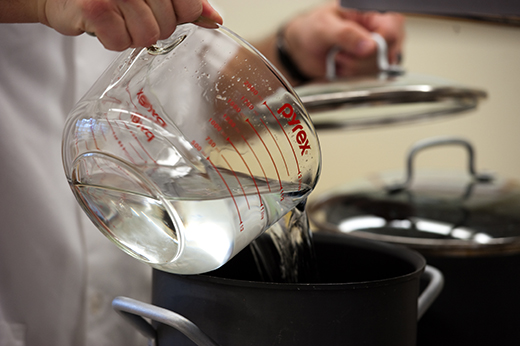Avoid a recipe for disaster with properly cooked food this Thanksgiving, expert says
Friday, Nov. 13, 2015

Turkey and side dishes cooked to 165 degrees Fahrenheit is one of the many tips a Kansas State University food safety experts shares with home cooks this Thanksgiving. | Download the following photo.
OLATHE — This Thanksgiving many Americans may find one uninvited guest at their meal: food poisoning. A Kansas State University food safety expert shares some food preparation tips for home cooks that will ensure guests pile their plates with safe food dishes and forgo a side of food poisoning.
"Thanksgiving is a time when many cooks turn to those old family recipes and preparation methods when making the meal," said Bryan Severns, manager of food programs and services at the Kansas State University Olathe campus. "I have seen many instances in which those traditional methods clash with safe food preparation and family members end up sick."
Seasoning is in, stuffing is out
Turkey, duck, quail and other game birds are simple to prepare. Those familiar images of a golden brown turkey filled with stuffing, though, are a recipe for disaster, Severns said.
"For a great tasting bird, rub the inside of the cavity with a seasoning/spice blend made from some salt and pepper and maybe a diced onion or fruit," Severns said. "Meanwhile, stuffing and dressing should be cooked separately to ensure the bird cooks all the way to 165 degrees Fahrenheit and that your dressing isn't based in raw turkey juices."
Also, Severns says never wash turkey or other raw poultry in the sink to prep it for cooking. There is no safety benefit to rinsing poultry. Instead, washing raw poultry greatly increases the chances of food poisoning as water with the raw juice is likely to splash the cook and the cooking area.
Your goose is cooked — to food safe levels
Juices, joints and timers cannot tell when turkey and other game birds are fully cooked. A calibrated meat thermometer can, Severns says. Use the thermometer to take temperatures in the thickest areas of the bird, such as the breast, thigh and leg. The bird is safe to serve once it reaches 165 degrees Fahrenheit.
Severns also suggests the following to keep holiday cooking efficient and food safe.
• Raw turkey juice as salad dressing? No way, Severns said. Never use the same cutting board for poultry, raw meats, eggs and vegetables without cleaning and sanitizing between projects.
• Plan your preparation by grouping similar items together to improve efficiency and food safety.
"If you're doing the bird first, clear the counters and sink areas," Severns said. "Set up your sudsy sink and a sanitation sink with bleach solution. Do all the raw bird prep and then clean and sanitize thoroughly, especially knives and cutting boards. Then move on to the veggies."
